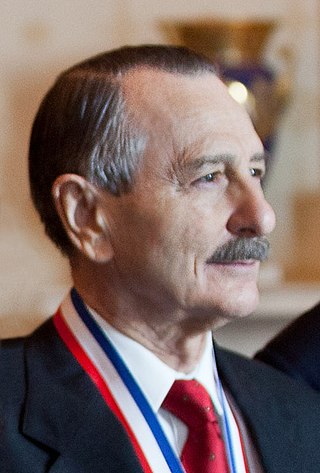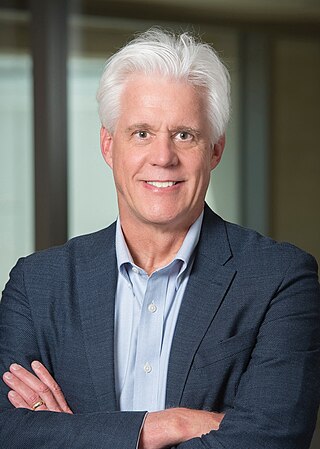Related Research Articles
Teratology is the study of abnormalities of physiological development in organisms during their life span. It is a sub-discipline in medical genetics which focuses on the classification of congenital abnormalities in dysmorphology caused by teratogens. Teratogens are substances that may cause non-heritable birth defects via a toxic effect on an embryo or fetus. Defects include malformations, disruptions, deformations, and dysplasia that may cause stunted growth, delayed mental development, or other congenital disorders that lack structural malformations. The related term developmental toxicity includes all manifestations of abnormal development that are caused by environmental insult. The extent to which teratogens will impact an embryo is dependent on several factors, such as how long the embryo has been exposed, the stage of development the embryo was in when exposed, the genetic makeup of the embryo, and the transfer rate of the teratogen.
Howard Robert Horvitz ForMemRS NAS AAA&S APS NAM is an American biologist whose research on the nematode worm Caenorhabditis elegans was awarded the 2002 Nobel Prize in Physiology or Medicine, together with Sydney Brenner and John E. Sulston, whose "seminal discoveries concerning the genetic regulation of organ development and programmed cell death" were "important for medical research and have shed new light on the pathogenesis of many diseases".
Ronald Mark Evans is an American Biologist, Professor and Head of the Salk’s Gene Expression Laboratory, and the March of Dimes Chair in Molecular and Developmental Biology at the Salk Institute for Biological Studies in La Jolla, California and a Howard Hughes Medical Institute Investigator. Dr. Ronald M. Evans is known for his original discoveries of nuclear hormone receptors (NR), a special class of transcriptional factor, and the elucidation of their universal mechanism of action, a process that governs how lipophilic hormones and drugs regulate virtually every developmental and metabolic pathway in animals and humans. Nowadays, NRs are among the most widely investigated group of pharmaceutical targets in the world, already yielding benefits in drug discovery for cancer, muscular dystrophies, osteoporosis, type II diabetes, obesity, and cardiovascular diseases. His current research focuses on the function of nuclear hormone signaling and their function in metabolism and cancer.
The Eunice Kennedy Shriver National Institute of Child Health and Human Development (NICHD) is one of the National Institutes of Health (NIH) in the United States Department of Health and Human Services. It supports and conducts research aimed at improving the health of children, adults, families, and communities, including:

Mario Ramberg Capecchi is an Italian-born molecular geneticist and a co-awardee of the 2007 Nobel Prize in Physiology or Medicine for discovering a method to create mice in which a specific gene is turned off, known as knockout mice. He shared the prize with Martin Evans and Oliver Smithies. He is currently Distinguished Professor of Human Genetics and Biology at the University of Utah School of Medicine.

Sir Martin John EvansFLSW is an English biologist who, with Matthew Kaufman, was the first to culture mice embryonic stem cells and cultivate them in a laboratory in 1981. He is also known, along with Mario Capecchi and Oliver Smithies, for his work in the development of the knockout mouse and the related technology of gene targeting, a method of using embryonic stem cells to create specific gene modifications in mice. In 2007, the three shared the Nobel Prize in Physiology or Medicine in recognition of their discovery and contribution to the efforts to develop new treatments for illnesses in humans.

Charles David Allis was an American molecular biologist, and the Joy and Jack Fishman Professor at the Rockefeller University. He was also the Head of the Laboratory of Chromatin Biology and Epigenetics, and a professor at the Tri-Institutional MD–PhD Program.
Philip Arden Beachy is Ernest and Amelia Gallo Professor at Stanford University School of Medicine in Palo Alto, California and an Associate at Stanford's Institute of Stem Cell Biology and Regenerative Medicine.

Ralph Lawrence Brinster is an American geneticist, National Medal of Science laureate, and Richard King Mellon Professor of Reproductive Physiology at the School of Veterinary Medicine, University of Pennsylvania.
The Dickson Prize in Medicine and the Dickson Prize in Science were both established in 1969 by Joseph Z. Dickson and Agnes Fischer Dickson.
The Edwin Grant Conklin Medal was inaugurated in 1995 by the Society for Developmental Biology in honor of the biologist Edwin Conklin. It is awarded annually to recognise a member of the society who has carried out distinguished and sustained research in developmental biology. The recipient delivers a feature lecture at the annual society meeting and is presented with a commemorative plaque.

Victor R. Ambros is an American developmental biologist and Nobel Laureate who discovered the first known microRNA (miRNA). He is a professor at the University of Massachusetts Medical School. He completed both his undergraduate and doctoral studies at the Massachusetts Institute of Technology. Ambros received the Nobel Prize in Physiology or Medicine in 2024 for his research on microRNA.

Gary Bruce Ruvkun is an American molecular biologist and Nobel laureate at Massachusetts General Hospital and professor of genetics at Harvard Medical School in Boston.
The Wiley Prize in Biomedical Sciences is intended to recognize breakthrough research in pure or applied life science research that is distinguished by its excellence, originality and impact on our understanding of biological systems and processes. The award may recognize a specific contribution or series of contributions that demonstrate the nominee's significant leadership in the development of research concepts or their clinical application. Particular emphasis will be placed on research that champions novel approaches and challenges accepted thinking in the biomedical sciences.

Eric Newell Olson is an American molecular biologist. He is professor and chair of the Department of Molecular Biology at the University of Texas Southwestern Medical Center in Dallas, where he also holds the Robert A. Welch Distinguished Chair in Science, the Annie and Willie Nelson Professorship in Stem Cell Research, and the Pogue Distinguished Chair in Research on Cardiac Birth Defects.
David Swenson Hogness was an American biochemist, geneticist, and developmental biologist and emeritus professor at the Stanford University School of Medicine in Stanford, California.

Clifford James Tabin is chairman of the Department of Genetics at Harvard Medical School.
Davor Solter is a Yugoslavian-born developmental biologist, particularly known for his pioneering work on mammalian genomic imprinting. He is Emeritus Member and Director, Max Planck Institute of Immunobiology and Epigenetics; Visiting International Professor, Siriraj Center for Excellence in Stem Cell Research, Mahidol University, Thailand; and Visiting Professor, University of Zagreb Medical School.
Kent L. Thornburg is an American scientist, researcher and professor. He lives in Portland, Oregon and works at Oregon Health & Science University (OHSU), in the School of Medicine. He is the director for both the OHSU Center for Developmental Health and the Moore Institute for Nutrition & Wellness
References
- ↑ "Richard B. Johnston, Jr., MD Prize in Developmental Biology". www.marchofdimes.org. Retrieved 2023-07-18.
- ↑ "2017 March of Dimes Prize awarded to Dr. C. David Allis for groundbreaking research".
- ↑ "Prize in Developmental Biology".
- ↑ Anon (2008). "An Interview With... Cliff Tabin". Nature Reviews Genetics. 9 (6): 420. doi:10.1038/nrg2863. PMID 18504824. S2CID 45619315.